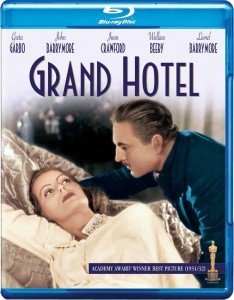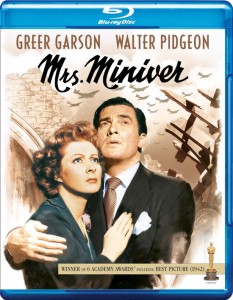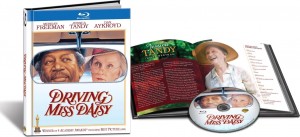As the 85th Academy Awards draw closer, film companies are distributing many of their classic, award winning films on Blu-ray for the first time. Warner Brothers has just released three from their vaults, each Best Picture winners and each from a different generation.
 Grand Hotel, the winner of the 1931/32 Academy Award for Best Picture (still the only movie to do so without receiving a nomination in any other category) was the brainchild of MGM wonder boy, Irving Thalberg. The legendary producer took the successful stage play with the same name and made it into one of the very first star-studded MUST SEE event movies. Thalberg cast some of the biggest names of the era to play the leads in Grand Hotel. Director Edmund Goulding’s ensemble drama featured Lionel Barrymore, John Barrymore, Wallace Beery, Joan Crawford, Lewis Stone and Greta Garbo. It’s in Grand Hotel that Garbo utters the line most closely associated with her, “I just want to be alone.”
Grand Hotel, the winner of the 1931/32 Academy Award for Best Picture (still the only movie to do so without receiving a nomination in any other category) was the brainchild of MGM wonder boy, Irving Thalberg. The legendary producer took the successful stage play with the same name and made it into one of the very first star-studded MUST SEE event movies. Thalberg cast some of the biggest names of the era to play the leads in Grand Hotel. Director Edmund Goulding’s ensemble drama featured Lionel Barrymore, John Barrymore, Wallace Beery, Joan Crawford, Lewis Stone and Greta Garbo. It’s in Grand Hotel that Garbo utters the line most closely associated with her, “I just want to be alone.”
The plot of the film is broken into three stories. In post WWI Berlin, Lionel Barrymore is Mr. Kringelein, an accountant who’s been told by doctors that he hasn’t long to live. Alone and depressed, Kringelein decides to spend his final days living in luxury and at the Grand Hotel, the most expensive hotel in Berlin. He’s befriended by the Baron, (John Barrymore), a hotel thief who is broke, owes people money, and has only ever known love through the affection he has for his dachshund.
The Baron connects all of the plots in Grand Hotel. After he meets Kringelein, he encounters a sexy stenographer played by Crawford. She’s at the hotel to take dictation from Beery’s Genreal Director Presing, a businessman close to sealing a company merger. Presing also happens to be Kringelein’s boss. The Baron and the stenographer hit it off and after five minutes of double entendres, they decide to meet for a hot date. He just has to steal the pearls belonging to a famous, fragile Russian ballerina (Garbo) first. But the Baron never makes it to the bar to meet the Stenographer. He gets trapped in the ballerina’s bedroom and thwarts her suicide plans. Soon enough, these two fall in love.
Like any ensemble movie, Grand Hotel has a lot going on. Having never seen the film, I was unsure what to expect; Given the era, I expected this film to be stagey and slow moving. But Grand Hotel moves along at a brisk pace (thanks to Goulding’s direction), each actor delivers great performances, and the script has relevance. What really blew me away was the style of the film. The art direction by Cedric Gibbons is amazing. Coupled with William H. Daniels’ sweeping camerawork and you’ll see why this film won Best Picture.
The Blu-ray contains features that look like they were produced for a previous DVD release. I must note that the quality of the print for the Grand Hotel Blu-ray is excellent. Except for a few minor jump cuts (where frames must have been lost), the movie looks and sounds great.
 Mrs. Miniver is another classic film I’ve long wondered about but have never seen, Winner of six Academy Awards in 1942, including Best Picture, the film juxtaposes idyllic country life in England during the late 30s with the fear and devastation of war (the Nazis invade England halfway through the movie). The tone of Mrs. Miniver is lighthearted and uplifting throughout, until the realities of war hit home and the entire movie takes a dark turn.
Mrs. Miniver is another classic film I’ve long wondered about but have never seen, Winner of six Academy Awards in 1942, including Best Picture, the film juxtaposes idyllic country life in England during the late 30s with the fear and devastation of war (the Nazis invade England halfway through the movie). The tone of Mrs. Miniver is lighthearted and uplifting throughout, until the realities of war hit home and the entire movie takes a dark turn.
Greer Garson (Best Actress winner for the film) stars alongside Walter Pidgeon. Together they are Kay and Clem Miniver. She’s a housewife and he’s a successful architect. They live is a large house with servants and a yard that butts up against the river. They have three children, youngsters Toby and Judy, and an older son who’s away at Oxford, Vin (Richard Ney).
When Vin returns home for a visit, he’s quick to share his intellectual views, taking a somewhat condescending tone with his parents, as most young men do when they think they know everything. During this visit the family meets Carol Beldon (Teresa Wright, Best Supporting Actress winner for the film) the granddaughter of Lady Beldon (Dame May Whitty), one of those rich, snobby widows who live in large manors and look down upon the common folk. Carol and Vin immediately butt heads, which is a sure sign that they’re going to fall in love. But who wouldn’t fall in love with Carol, she’s played by Teresa Wright. Just sayin’.
When England declares war on Germany, Vin joins the Royal Air Force; Clem becomes a volunteer, using his boat to assist the military and small community where they live binds together. While the tone of the film continues to be somewhat chipper, there are some particular harrowing moments. When an injured Nazi soldier forces his way into the Miniver home, Clem is away and Kay must deal with him, doing her best to keep the rogue away from the children. A scarier scene takes place with the entire Miniver family (sans Vin) is holed up in their bomb shelter and the Germans bomb the countryside. While the little ones try to sleep, Kay and Clem maintain their upright, English stature, yet the worried looks they exchange reveal their true scared feelings.
Despite having their home suffering extensive damage and the fate of their country uncertain, the Minivers lead with their heads held high, refusing to succumb to the terrible effects of war. I have to admit that this wasn’t a tone I was expecting from a wartime drama, especially based on the highly dramatic Blu-ray cover art. But one has to assume that the filmmakers were trying to inspire people during a terrible time of war.
Overall, Mrs. Miniver does something deceptive to the audience. It builds up a ”we’ll make it through this darn war” upbeat attitude, setting us up for a tragic turn of events at the end of the film. I won’t tell you what it is because I feel as if this is one Academy Award winner that’s worth finding and giving a look.
 The latest film from Warner Brothers to get the deluxe Blu-ray box treatment is Driving Miss Daisy, winner of the Academy Award for Best Picture in 1989. Although I’ve seen portions of the film on basic cable throughout the years, I hadn’t seen it in its entirety since its initial release. Just as I remembered, it’s a pleasant movie with a warm message, one that I appreciate a little more now that I’m not some film school punk. Back then I was rooting for Oliver Stone’s Born on the Fourth of July to win because it was serious. This time around I better appreciate the artistic merits of Driving Miss Daisy, something I dismissed back then.
The latest film from Warner Brothers to get the deluxe Blu-ray box treatment is Driving Miss Daisy, winner of the Academy Award for Best Picture in 1989. Although I’ve seen portions of the film on basic cable throughout the years, I hadn’t seen it in its entirety since its initial release. Just as I remembered, it’s a pleasant movie with a warm message, one that I appreciate a little more now that I’m not some film school punk. Back then I was rooting for Oliver Stone’s Born on the Fourth of July to win because it was serious. This time around I better appreciate the artistic merits of Driving Miss Daisy, something I dismissed back then.
As the informative booklet and Blu-ray featurettes explain, Driving Miss Daisy began as a stage play written by Alfred Uhry, enjoying a successful run Off-Broadway and winning the Pulitzer Prize for Drama. Hollywood came calling and the Zanucks, Richard and Lili, won out. Being a Hollywood power couple should have made it easy to get the movie made, but even the Zanuck’s had a difficult time finding backing for this intimate story about an aging Jewish woman and her friendship with her black chauffeur. Only after the Zanucks cut their budget nearly in half and reduced the number of shooting days did Warner Brothers agree to finance the movie.
Australian Bruce Beresford was hired to direct Uhry’s adaptation of his play, thanks in part to his handling of the Robert Duvall southern drama, Tender Mercies. For the role of Hoke, Morgan Freeman, who had originated the stage role, was cast as the lead. It’s important to know that Freeman wasn’t a household name in the late 80s. Driving Miss Daisy and his excellent performance helped the longtime stage actor break through in movies that year (along with his work in 1989s Civil War epic, Glory). Only after the success of this film would he go on to do his most popular work in films such as Unforgiven, The Shawshank Redemption, Se7en and Million Dollar Baby.
Jessica Tandy had a storied career on stage, but the elderly actress had a limited film resume. The producers were approached by the likes of Elizabeth Taylor and Shirley MacLaine, but all involved felt that the role of Miss Daisy should have authenticity and not be performed by a woman in her 50s wearing tons of latex make-up effects. What a wise decision it was to go with Tandy, as she made the role her own and it’s difficult to imagine anyone playing the part.
Twenty years ago I focused so much on the story of this film, that I overlooked the performances and the on screen chemistry of the two leads. Tandy is so good she received an Academy Award for the film. She does subtle, graceful work and gives Miss Daisy an independent streak that women of all ages can admire. The iconic Freeman also does exceptional acting in the film. We’ve become accustomed to this great actor playing heroic father figures, mentors to super heroes and even God. In Driving Miss Daisy, he disappears into the part of an aged black servant who ”knows his place” in Miss Daisy’s segregated world, but grows to become her most trusted confidant and best friend. Freeman gives a nuanced, moving performance, one that in another year might have won him the Academy Award he was nominated for (in 1989 he lost to some unknown newcomer named Daniel Day Lewis, whose winning work in My Left Foot is legendary).
Not everything about the film has aged well. Hans Zimmer’s score feels quite dated, especially the electronic keyboards. Still, if you’re like me and you wrote off Driving Miss Daisy as sentimental hokum, give the film a second chance, especially on this remastered Blu-ray. There are two master actors at play in the movie and they are worth watching.





Comments